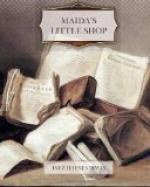Arthur and Dicky sat opposite each other, working at the round table.
“What do you think of that dog now, Maida?” Rosie asked proudly. “His name is ‘Tag.’ You wouldn’t know him for the same dog, would you? Isn’t he a nice-looking little puppy?”
Tag did look like another dog. He wore a collar and his yellowy coat shone like satin. His whole manner had changed. He came running over to Maida and stood looking at her with the most spirited air in the world, his head on one side, one paw up and one ear cocked inquisitively. His tail wriggled so fast that Delia thinking it some wonderful new toy, kept trying to catch it and hold it in her little fingers.
“He’s a lovely doggie,” Maida said. “I wish I’d brought Fluff.”
“And did you ever see such a dear baby,” Rosie went on, hugging Delia. “Oh, if I only had a baby brother or sister!”
“She’s a darling,” Maida agreed heartily. “Babies are so much more fun than dolls, don’t you think so, Rosie?”
“Dolls!” No words can express the contempt that was in Miss Brine’s accent.
“What are you doing, Dicky?” Maida asked, limping over to the table.
“Making things,” Dicky said cheerfully.
On the table were piles of mysterious-looking objects made entirely of paper. Some were of white paper and others of brown, but they were all decorated with trimmings of colored tissue.
“What are they?” Maida asked. “Aren’t they lovely? I never saw anything like them in my life.”
Dicky blushed all over his face at this compliment but it was evident that he was delighted. “Well, those are paper-boxes,” he said, pointing to the different piles of things, “and those are steamships. Those are the old-fashioned kind with double smokestacks. Those are double-boats, jackets, pants, badges, nose-pinchers, lamp-lighters, firemen’s caps and soldier caps.”
“Oh, that’s why you buy all that colored paper,” Maida said in a tone of great satisfaction. “I’ve often wondered.” She examined Dicky’s work carefully. She could see that it was done with remarkable precision and skill. “Oh, what fun to do things like that. I do wish you’d show me how to make them, Dicky. I’m such a useless girl. I can’t make a single thing.”
“I’ll show you, sure,” Dicky offered generously.
“What are you making so many for?” Maida queried.
“Well, you see it’s this way,” Dicky began in a business-like air. “Arthur and Rosie and I are going to have a fair. We’ve had a fair every spring and every fall for the last three years. That’s how we get our money for Christmas and the Fourth of July. Arthur whittles things out of wood—he’ll show you what he can do in a minute—he’s a crackajack. Rosie makes candy. And I make these paper things.”
“And do you make much money?” Maida asked, deeply interested.
“Don’t make any money at all,” Dicky said. “The children pay us in nails. I charge them ten nails a-piece for the easy things and twenty nails for the hardest. Arthur can get more for his stuff because it’s harder to do.”




